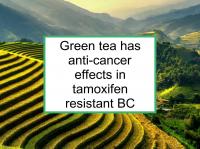While population studies have produced inconsistent results as to whether green tea consumption reduces breast cancer risk, it is associated with reduced risk of recurrence. This appears to be at least in part because the green tea polyphenol epigallocatechin gallate (EGCG) increases the effectiveness of some forms of breast cancer treatment.
Now a new study has reported that EGCG can slow the development of tamoxifen resistance in hormone receptor positive breast cancer cells.
Green tea increases effectiveness of some breast cancer treatments
EGCG has been shown to potentiate the efficacy of radiation treatment in breast cancer patients by increasing radiation-induced apoptosis (programmed cell death). EGCG increases the treatment effects of trastuzumab (Herceptin) in HER2 overexpressing (HER2+) breast cancer cells. EGCG has also been shown to enhance the cytotoxicity of paclitaxel. On the other hand, green tea should not be consumed during doxorubicin chemotherapy because of its caffeine content (caffeine protects cancer cell DNA from the cytotoxic effects of doxorubicin).
Latest research: EGCG reduces tamoxifen resistance
The study referenced at the beginning of this news story was designed to investigate whether EGCG can influence the development of tamoxifen resistance in hormone receptor positive (ER+/PR+) breast cancer cells. Although ER+ breast cancer survival has increased as a result of anti-estrogens such as tamoxifen, many women develop resistance to the treatment.
To conduct the study, the authors first developed a cell culture model of tamoxifen resistance using ER+/PR+ MCF-7 breast cancer cells. This was accomplished by using a prolonged culture of MCF-7 cells exposed to increasing concentrations of tamoxifen. The treatment served to apply selection pressure for the cells to acquire resistance to tamoxifen. The surviving cells were found to maintain their tamoxifen resistance even after removal of the tamoxifen treatment.
The authors then tested the influence of EGCG using this long-term cell culture model by culturing groups of MCF-7 cells with various levels of tamoxifen and EGCG. The breast cancer cell growth rate was recorded for each treatment iteration. Initially, the cells grew at the same rate regardless of whether they were exposed to tamoxifen alone or tamoxifen plus EGCG. However, eventually the growth rate of EGCG-treated breast cancer cells was delayed compared to cells treated with tamoxifen only. In addition, the cells that had undergone multiple generations of treatment with EGCG were shown to retain their sensitivity to tamoxifen.
The authors conclude that EGCG might delay the development of tamoxifen resistance in breast cancer cells.
Please see our articles on green tea and what to eat during tamoxifen treatment for more information.
